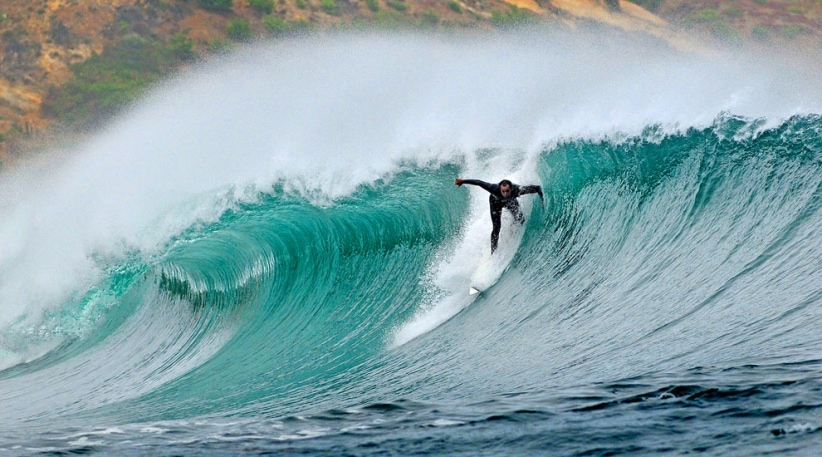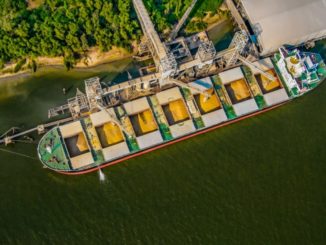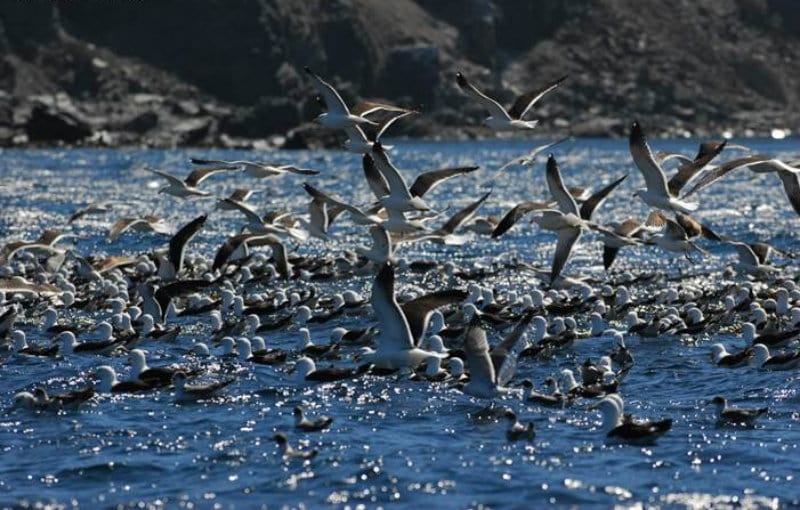
By Colin Robinson
It was mid spring in southern Chile and the morning sun was pushing light through the forest as we made our way along the gravel coastal road. The stoke was high. We’d left our camp spot at Rinconada, where the remnants of a heavy swell had produced long, thick, crumbling lefts that we shared only with a few fisherman and one bodysurfer. He had wished us well and had seemed quite stoked off his encounter with four low-budget Canadians who’d somehow managed to buy a Chilean van for their first real surf-safari. So, nourished with fresh local fish, the good vibes of a friendly soul surfer, and a deep sleep on the beach, we neared the famous left point break, Buchupureo.
The sunny stretch of rural coast, known as Comuna Cobquecura, is home to several sleepy fishing villages, and is blessed with numerous world class left-points. With most of Santiago’s surf-traffic syphoned off further north at Pichilemu and Punta de Lobos, Cobquecura sees few chilean surfers make the eight-hour drive, and even fewer international surf tourists. But the bountiful coastline has been featured in numerous international surf movies and we’d soon learn the spot is under more pressure than it seemed that quiet spring morning.
I was halfway into my wetsuit when the first truck rolled up beside us in the Buchu parking lot. The driver didn’t acknowledge us but walked to the cedar railing that lined the steep, lush bluff couched against the parking. Two more vehicles arrived. Boards in the back, stickers on the windows. One that said “En Cobquecura, no a las salmoneras.” I’d seen the stickers all over this stretch of coast, and had heard talk of the proposed commercial salmon fishery. The local guys weren’t saying much to each other and they watched the single surfer below as he took short rides on sections that were not linking. I’d stopped suiting up and pretended to continue gauging the waves, dodging the occasional stony glance from the goon squad. Yesterday’s swell had waned and there’d be no long rides today.
The exchange that followed probably wasn’t as dramatic as it felt to us. But being from Canada, where everyone is annoyingly nice and the water is way too cold to be upset anyway, we were a little rattled. Plus, our first encounter with localism in the Chilean climbing community a week earlier had consisted of some friendly college students approaching us and offering us a beer. One local surfer flatly told us to go home. Another guy asked us where we’d stayed, looking at our camper van, and told us we’d better not have camped at Buchu. We wanted to try to rectify the situation, to let these guys know we’re respectful perhaps to the point of being timid. We were able to squeeze a longer conversation out of the situation and learned that this tiny fishing village was seeing the crowds rise here. They had a mix of stoke and fear of professionals arriving with photography teams, and knew their secluded wave was being frothed over by surfers around the world, even this far off the beaten path.
Trying to move the conversation away from gringos crowding the wave, I asked about the “no a las salmoneras” sticker. He’d hardly looked at me as he spoke, and continued staring out at the sea. The sunshine had become cold and hard. He didn’t want to be talking about the fisheries because he didn’t want them there. He didn’t want to talk to us because he didn’t want us there. But surfers not born next to world class waves will travel. And corporations will always be looking to exploit natural resources. “These guys from Santiago want to put in these monocultivos, off the shore. It makes the fish weak; they have to pump them with chemicals. It makes it hard for the local people to make a living fishing. It affects the waves.”
Resource development has long been a mainstay of the Chilean economy. But increasingly, Santiago-based corporations, in many ways backed by the government, have been broadening their forays into the bountiful natural paradise of Southern Chile. In early 2016, Inversiones Pelican announced the development of 11 offshore fisheries along the southern coast, including a concentration in the waters off Comuna Cobquecura. The locals knew that wealth generated would be funneled back to Santiago. They knew the health of the local ecosystem and by extension, the local economy, would be harmed. Comuna Cobquecura took action; a whole community mobilized. By the morning we four Canadians got the cold shoulder at Buchu, Inversiones Pelican had announced a one year moratorium on project development after facing a massive rejection by social organizations, coastal communities and tourism operators.
The guy who’d done most of the talking then turned towards his truck. His community was under fire. “You gotta be careful around here, you might come back from surfing and find your tires slashed or something like that.” A threat, or words of advice? Perhaps both.
The very nature of surfing entails having to compete for and even share the same waves. Sharing is something humans have always struggled with and it is something that involves respect from all parties involved. Just as corporations from capital cities cannot barge in and monopolize the aquatic ecosystem at the expense of the local community, neither can surf tourists from Santiago or from further abroad. In an increasingly globalized and corporatized world, activism and localism are important. The frustrations felt in the surfing and fishing communities of Cobquecura are absolutely justified.
When it comes to surfing, mild, peaceable localism, can even be a good thing, so long as all parties involved remember that respect begets respect. So for surfers, climbers, skiers, extreme tobogganers, or anyone who practices a sport that relies on a shared natural resource, it comes down to how we relate to one another within our communities. And in an age when the resources we enjoy are increasingly under pressure from development and climate change, we need our communities to stand together more than ever.
— Colin is a Canadian writer, surfer, and social innovation enthusiast whose love for the ocean and mountains was born in the Pacific Northwest and grew during trips down the left coast to Southern California. Most recently, he helped start a social entrepreneurship project in the Latin American metropolis of Lima, Peru while exploring a surf scene and culture worlds apart from the tall trees and cold seas of Vancouver Island.
Published with permission from http://www.theinertia.com



